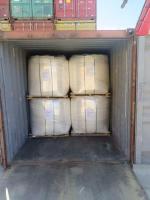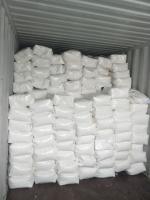Our Products
Polyacrylamide / nonionic polyacrylamide FLODRILL TS2112 can be replaced by Chinafloc N0009
495_small.jpg)
Application of Nonionic Polyacrylamide (FLODRILL TS2112)
FLODRILL TS2112 is a specialized nonionic polyacrylamide designed for demanding solid–liquid separation processes, particularly in drilling, tunneling, construction slurry management, mining, and industrial wastewater treatment. As a nonionic polymer, FLODRILL TS2112 contains no cationic or anionic functional groups, giving it excellent chemical stability, high molecular weight, and strong bridging flocculation ability in situations where electrically charged flocculants underperform.
Its neutrality allows it to remain effective under extreme pH, high salinity, high-temperature mud systems, and in streams containing multivalent metals or organic contaminants. Because of this, FLODRILL TS2112 is widely used in complex geological formations, variable drilling fluids, industrial wastewater, and fine-particle suspensions that are difficult to treat.
The following sections provide a comprehensive 920-word discussion of the primary applications of FLODRILL TS2112 nonionic polyacrylamide.
1. Drilling, Tunneling & Civil Engineering Applications
1.1 Tunnel Boring Machine (TBM) Slurry Treatment
FLODRILL TS2112 is frequently used in EPB (Earth Pressure Balance) and slurry-type TBM operations. During tunneling, the excavated soil mixes with bentonite or polymer-based slurry and forms a high-fines suspension. TS2112 helps:
-
Flocculate ultra-fine clays, silts, and rock flour
-
Accelerate sedimentation in desanders/desilters
-
Improve separation efficiency of TBM slurry plants
-
Reduce water consumption and bentonite usage
-
Enhance spoil dewatering for transportation and disposal
Nonionic polymers perform well in TBM environments where ionic polymers can be destabilized by fluctuations in pH, salinity, or mineral composition.
1.2 Horizontal Directional Drilling (HDD)
In HDD operations used for pipeline, conduit, or fiber-optic installation, FLODRILL TS2112:
-
Stabilizes the drilling mud
-
Improves viscosity control and cuttings suspension
-
Reduces fluid loss into formations
-
Enhances solids removal in recycling units
Its ability to perform under mixed geological conditions—such as gravel–clay interfaces or sand–silt layers—makes TS2112 suitable for long-distance HDD drilling.
1.3 Diaphragm Wall (D-Wall), Bored Pile, and Foundation Drilling
Nonionic polyacrylamides such as TS2112 are used to condition the drilling fluids used in deep foundation construction, including:
-
diaphragm walls
-
bored piles
-
secant piles
-
deep shafts
Key benefits include:
-
Improved sediment removal from bentonite slurry
-
Effective treatment of fine silts and clay particles
-
Better cleaning of construction mud before disposal
-
Lower chemical consumption compared to ionic flocculants in some soils
This enhances fluid stability and reduces disposal volumes, improving environmental compliance.
1.4 Microtunneling and Pipe Jacking
Microtunneling often produces high-fines mud that overwhelms separation units. FLODRILL TS2112:
-
Promotes rapid flocculation of silts and clay fines
-
Increases separation efficiency of screens, centrifuges, and hydrocyclones
-
Enhances spoil dewatering
-
Maintains consistent slurry properties
Its chemical neutrality prevents interference with lubricants or anti-wear additives used in jacking systems.
2. Industrial & Municipal Wastewater Treatment
2.1 Clarification of Industrial Effluents
FLODRILL TS2112 is used in industries where wastewater contains neutral colloids, organic solids, metal oxides, or high-salinity residues. Typical sectors include:
-
mining and mineral processing
-
chemical manufacturing
-
petrochemical operations
-
textile and dyeing
-
pulp and paper
-
food processing
TS2112 improves:
-
turbidity reduction
-
sedimentation rate
-
sludge density
-
effluent clarity
Nonionic polymers are especially effective when charged polymers react with chemicals present in the wastewater and lose performance.
2.2 Municipal Wastewater Clarification
In municipal systems, FLODRILL TS2112 assists in:
-
primary clarifier performance
-
secondary settling after biological treatment
-
tertiary polishing before discharge or reuse
It works well with biological systems because it does not interfere with microbial activity, nitrification, or sludge floc structure.
2.3 DAF (Dissolved Air Flotation) Performance Enhancement
TS2112 improves DAF operation by:
-
forming uniform flocs that attach better to microbubbles
-
aiding removal of oils, fats, and floating solids
-
increasing skimmability and reducing sludge volume
It is particularly useful where wastewater chemistry varies widely.
3. Sludge Thickening and Dewatering Applications
3.1 Mechanical Dewatering
FLODRILL TS2112 is effective in equipment such as:
-
belt presses
-
centrifuges
-
screw presses
-
filter presses
-
rotary thickeners
It enhances dewatering by:
-
forming shear-resistant, stable flocs
-
increasing water release
-
reducing polymer consumption
-
improving cake dryness
It is ideal for biological sludge, oily sludge, and mixed slurries that contain fine particles and organic matter.
3.2 Gravity Thickening
Nonionic polyacrylamide enhances:
-
sludge settling velocity
-
solids concentration
-
thickener throughput
Its low charge prevents adverse reactions in sludge containing metal ions or surfactants.
4. Mining & Mineral Processing Applications
4.1 Tailings Thickening and Water Recycling
TS2112 is used to treat tailings from:
-
coal washing
-
gold and copper mining
-
iron ore beneficiation
-
kaolin and clay extraction
It provides:
-
rapid settling of ultra-fine minerals
-
improved clarity of recycled process water
-
consolidation of tailings for storage stability
The polymer remains stable even in acidic, alkaline, or saline tailings.
4.2 Mineral Separation and Beneficiation
In mineral beneficiation circuits, TS2112 helps:
-
reduce viscosity of fine suspensions
-
enhance sedimentation after grinding or flotation
-
clarify process water for reuse
Because it is nonionic, it does not destabilize flotation reagents or mineral conditioning chemicals.
5. Oil & Gas and Petrochemical Applications
5.1 Produced Water Treatment
TS2112 is suitable for treating produced water containing:
-
fine solids
-
organics
-
heavy metals
-
high salinity
Its stability under high ionic strength conditions makes it useful for offshore and onshore oilfield operations.
5.2 Refinery and Petrochemical Wastewater
It helps remove:
-
emulsified hydrocarbons
-
process chemicals
-
catalyst fines
-
suspended solids
through flocculation and improved separation efficiency.
Conclusion
FLODRILL TS2112 nonionic polyacrylamide is a highly adaptable flocculant designed for demanding solid–liquid separation applications. Its neutrality gives it broad compatibility in drilling, tunneling, HDD, D-wall foundation construction, industrial wastewater, municipal treatment, mining tailings, and petrochemical effluent treatment. By providing strong flocculation across variable chemical conditions, TS2112 enhances water clarity, improves dewatering efficiency, reduces sludge volumes, and stabilizes slurry systems in complex environments.



710_small.jpg)

